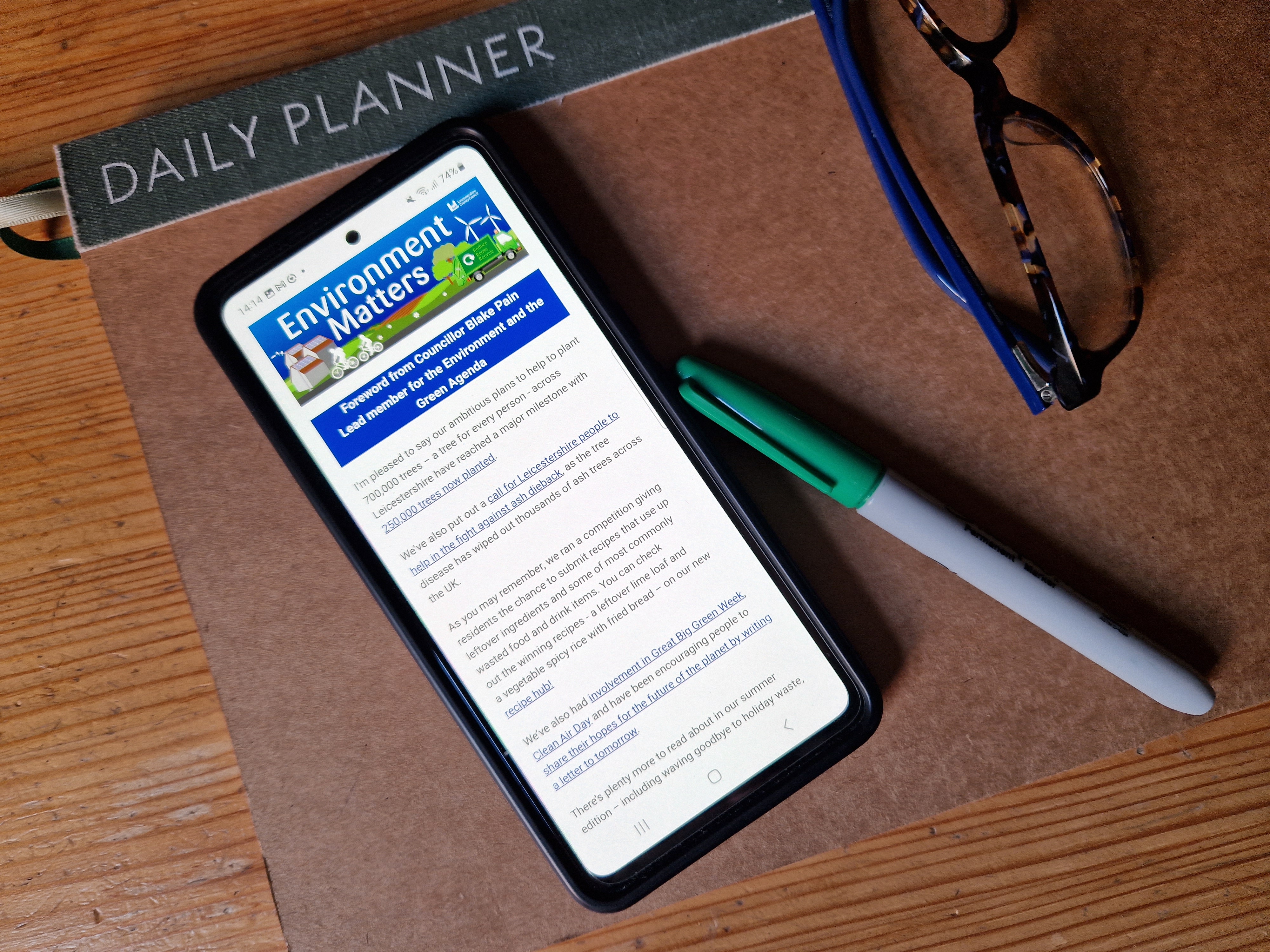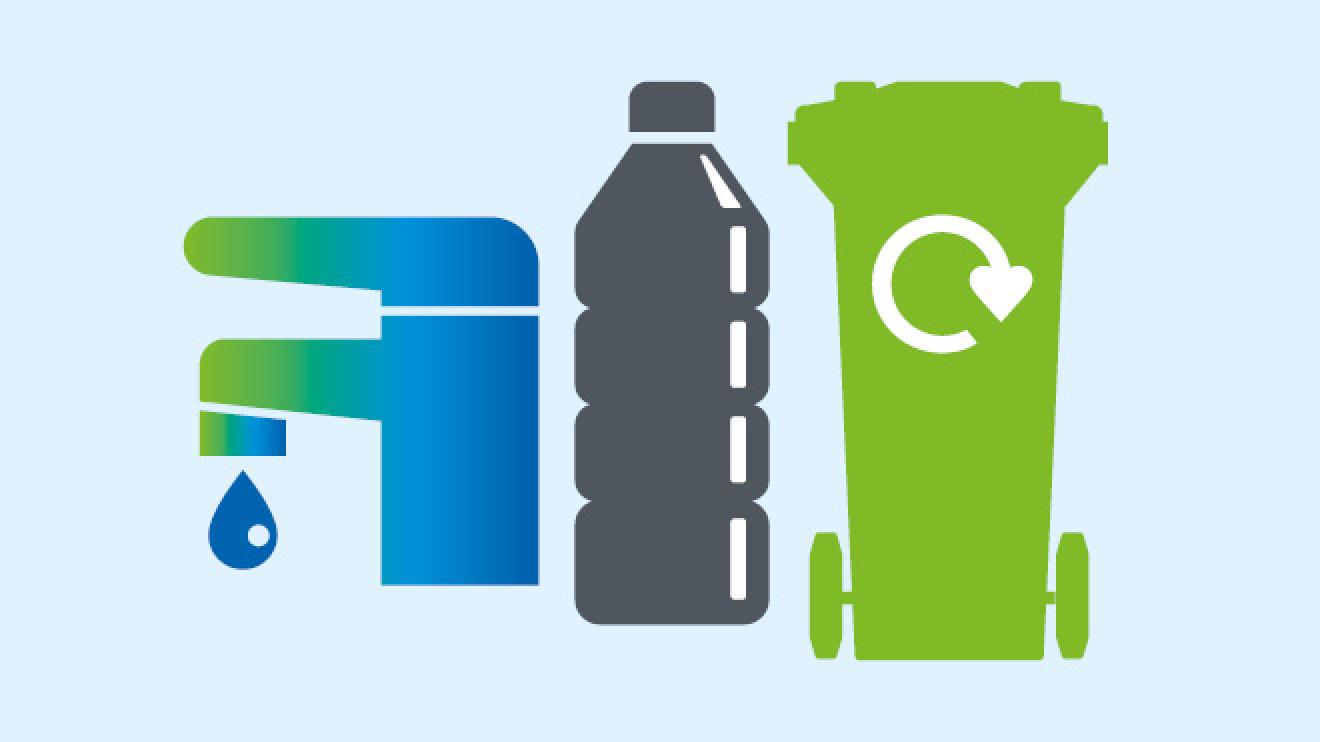Every item we buy has an environmental footprint. From the raw material mined to create it, to the pollution emitted during production, to the packaging that ends up being thrown away.
Lower the amount you throw away to reduce your carbon footprint by following the three ‘R’s’
Reduce
Water
6% of the UK’s total greenhouse gas emissions come from household water supply and use (estimate by Waterwise in 2021).
90% of these water related emissions are derived from the way we use water at home through heating water and the use of appliances such as washing machines, dishwashers and electric showers.
You can conserve water by following these top tips:
- Taking shorter showers
- Turning off taps when not in use, including brushing your teeth - a running tap uses around 9 litres of water a minute
- Running washing machines and dishwashers when there is a full load
- Fitting a water butt to collect rainwater from your roof to water your plants
- Washing fruit and vegetables in a bowl of water so the water can be recycled for another purpose
- Checking regularly for leaks on your internal plumbing
To support households, water suppliers Severn Trent are subsidising products such as water butts
Food
Producing, transporting, and disposing of uneaten food releases 8-10% of global greenhouse gas emissions.
In Leicestershire, around a third of rubbish in black bins is food waste.
Taking simple steps can help reduce waste and emissions and save you money with Love Food Hate Waste tips and advice on how to reduce food waste including preparation, portion sizes, understanding food dates, and storing food in the best way. You can also find out how to use leftovers to create tasty meals.
Find out how to compost vegetable and fruit peelings - a great way of helping the environment with the added benefit of producing a free-soil conditioner for your garden.
Plant-based alternatives
A meat rich diet generates considerably more carbon emissions than a plant-rich diet.
Consider substituting meat with plant-based alternatives by making one dinner a week meat-free, replacing meat in your favourite casseroles with beans or lentils or making vegetables the main in your stir-fry instead of chicken.
Find plant-based diet recipes to help you on your journey.
Reuse
Clothing
Over 5% of the UK’s total annual carbon and water footprints are caused by clothing production.
Give clothes another life by swapping, borrowing, renting, or buying second-hand.
Loving your clothes starts with buying smarter. This means choosing clothes which are well made and easy to care for. These clothes don’t have to be bought new but can be bought at a charity shop or on online sites such as eBay, Vinted, and Facebook Marketplace at a fraction of the cost. Alternatively, you could hire something, especially if it’s for a one-off occasion.
There’s plenty of information on reducing the impact of your clothes, with handy tips and guides on the Less Waste website
Repair
By repairing items instead of buying new, you eliminate the entire production process and the associated carbon emissions.
Common repairs you can do yourself include:
-
Clothes – find lots of relevant advice on caring for your clothes, including information on washing, drying, ironing and stain removal.
-
Furniture – like fast fashion, ‘fast furniture’ is increasingly becoming more common leading to higher disposal rates. Before throwing away furniture, consider whether it can be fixed at home. YouTube is a great source of information for tutorials and step-by-step walkthroughs on quick fixes.
-
Household appliances – similarly, there's an abundance of small appliance and machine repair advice on the internet as well as the opportunity to buy small repair components easily and cheaply online. Repair cafes and fixer groups can also offer support. If your appliance has reached end of life, refer to our A to Z guide on how to safely dispose of it.
Recycle
Leicestershire’s household recycling rate was 41.8% in 2022/23. That’s a bit lower than the average for England which was 43.3%, so there’s still plenty of opportunity for improvement in our recycling habits.
Here are some top tips to help you get the most out of your recycling:
-
If you need to dispose of something but are not sure of your options, use our A to Z guide which covers some of the items that cause confusion, or take a look at our recycling guide on the Less Waste website.
-
Items for recycling should be clean and dry, so make sure to empty food and drink containers, give them a quick rinse and then leave to drain before recycling.
-
Remember to put lids back on to jars and bottles before popping them in your recycling bin.
-
Avoid contamination by selecting the right bin. Disposable nappies, food waste, batteries and textiles should never go into your recycling bin.
To learn more about what you can do to stop valuable resources going to waste, visit the Less Waste website
Refuse single-use items
Single-use items are damaging to the environment as they are disposed of after just one use, irrespective of the time, energy and effort that has gone into producing and exporting/importing them. This can be especially harmful when items are made from non-recyclable material.
Try to seek alternative reusable items where possible to help cut waste and reduce emissions associated with production.
The most common reusable items you can swap in your household are:
-
Refillable water bottles instead of single-use bottles.
-
Reusable storage boxes instead of single-use plastic snack bags – perfect for school lunches and picnics.
-
Reusable cloth towels instead of ordinary paper towels.
-
Washable cotton pads and face cloths instead of cotton pads or facewipes – these can be washed and used again and again.
-
Reusable shopping bags and tote bags instead of single-use plastic bags.
-
Silicone bowl covers instead of cling film.
Go a step further by visiting refill stations in Leicestershire. Some examples include:
Ekojoe, Gladstone St, Fleckney, Leicester LE8 8AG
Refill Revolution, 65 St Mary's Road, Market Harborough, LE16 7DS
NEXTGEN Refill Station in Market Bosworth, No. 3, Wheatsheaf Courtyard, Market Place, CV13 0LR

